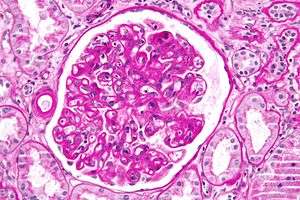Transplant glomerulopathy
| Transplant glomerulopathy | |
|---|---|
 | |
| Micrograph showing a glomerulus with changes characteristic of a transplant glomerulopathy. PAS stain. | |
| Classification and external resources |
Transplant glomerulopathy, abbreviated TG, is a disease of the glomeruli in transplanted kidneys. It is a type of renal injury often associated with chronic antibody-mediated rejection. However, transplant glomerulopathy is not specific for chronic antibody-mediated rejection; it may be the result of a number of disease processes affecting the glomerular endothelium.[1]
Pathology
It is characterized by glomerular basement membrane thickening (referred to as tram-tracking of the basement membrane), increased mesangial matrix and segmental and global glomerulosclerosis.
The differential diagnosis of tram-tracking includes membranoproliferative glomerulonephritis (especially hepatitis C), and thrombotic microangiopathies.[1]
Additional images
 Intermed. mag.
Intermed. mag. High mag.
High mag.
See also
References
This article is issued from Wikipedia - version of the 1/31/2014. The text is available under the Creative Commons Attribution/Share Alike but additional terms may apply for the media files.